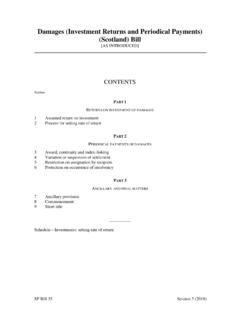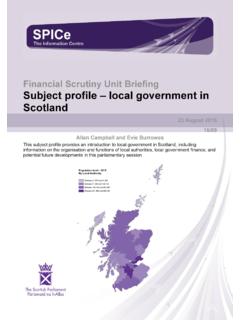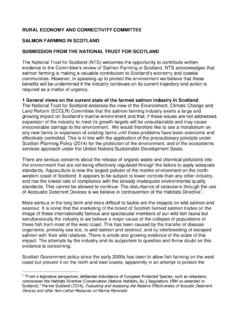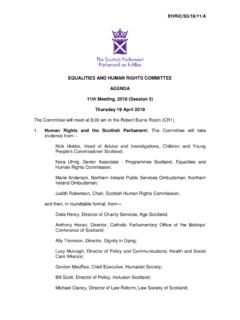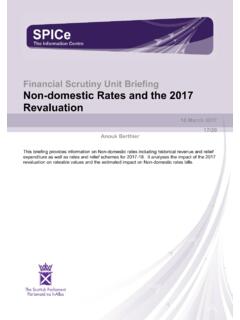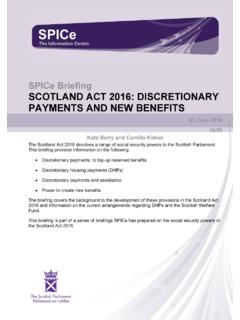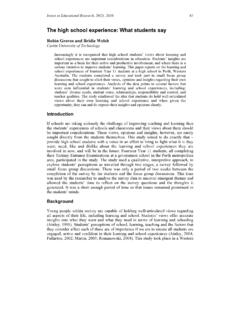Transcription of LEGISLATIVE CONSENT MEMORANDUM …
1 LCM-S5-10 Session 5 (2017) LEGISLATIVE CONSENT MEMORANDUM EUROPEAN UNION (WITHDRAWAL) BILL Introduction 1. The Scottish government remains of the view that the best option for the UK as a whole, and for Scotland, would be the one Scotland voted for to remain in the EU. However, whilst still opposing exit, the Scottish government accepts that preparations should be made for withdrawal from the EU, including preserving a functioning legal system. 2. The European Union (Withdrawal) Bill was introduced in the House of Commons on 13 July 2017.
2 As the Bill is a relevant Bill under Rule of the Parliament s Standing Orders1, this MEMORANDUM has been lodged by Rt Hon Nicola Sturgeon MSP, First Minister of Scotland, in accordance with Rule (a). The Bill and supporting documents can be found at: This MEMORANDUM relates to the Bill as introduced. 3. The Scottish government does not currently intend to lodge a LEGISLATIVE CONSENT motion in relation to the Bill. In line with Rule (d) of the Standing Orders, the Scottish government 's reasons are set out in paragraphs 12 - 32.
3 The Scottish government is proposing amendments which would allow it to recommend to the Parliament that it should CONSENT to the Bill. The Scottish government may lodge a further supplementary LEGISLATIVE CONSENT MEMORANDUM , potentially with a draft LEGISLATIVE CONSENT motion, on this Bill in due course, depending on progress with amendments and other negotiations with the UK government . Content of the Bill 4. The Explanatory Notes to the Bill2 set out the UK government s view of its purpose and main functions.
4 It describes the principal purpose of the Bill as: to provide a functioning statute book on the day the UK leaves the EU. As a general rule, the same rules and laws will apply on the day after exit as on the day before. It will then be for Parliament and, where appropriate, the devolved legislatures to make any future changes. (Paragraph 10) The Explanatory Notes describe four main functions of the Bill (at Paragraph 11): repeals the European Communities Act 1972; converts EU law as it stands at the moment of withdrawal into domestic law before the UK leaves the EU.
5 Creates powers to make secondary legislation, including temporary powers for corrections to be made to the laws that would otherwise no longer operate 1 2 2 appropriately once the UK has left the EU, and to implement a withdrawal agreement; claims it maintains the current scope of devolved decision making powers in areas currently governed by EU law but seeks to restrict the competence in devolved areas currently subject to EU law when EU law no longer applies.
6 5. Detail of the structure and provisions of the Bill is at Annex A. Of particular relevance to devolved matters are: Clauses 2 6 (which preserve and retain EU law in domestic law, including in areas within devolved competence); Clauses 7 9 (which provide powers for UK Ministers to correct retained EU law and implement international obligations and the withdrawal agreement with the EU, including in devolved areas); Clause 10 and Schedule 2 (which provide powers for Scottish Ministers to correct retained EU law and implement international obligations and the withdrawal agreement with the EU); Clause 11 and Schedule 3 (which constrain the competence of the Scottish Parliament and Scottish Ministers).
7 And Schedule 7 (which sets out LEGISLATIVE procedures to be followed for various secondary legislation provisions in the Bill, including powers of Scottish Ministers and UK Ministers acting in devolved areas). Background 6. The Prime Minister first announced a Great Repeal Bill in her speech to the Conservative Party conference on 2 October 20163. She envisaged a Bill to repeal the European Communities Act 1972 and end the direct applicability of EU law to the United Kingdom, while converting the body of existing EU law into domestic law.
8 7. The UK government developed its proposals further in its white papers on The United Kingdom s exit from, and new partnership with, the European Union4 (February 2017) and, particularly, Legislating for the United Kingdom s withdrawal from the European Union5 (May 2017). The latter contained a chapter on Interaction with the devolution settlements , which said the [UK] government intends to replicate the current frameworks provided by EU rules through UK legislation , followed by intensive discussions with the devolved administrations to identify where common frameworks need to be retained in the future (paragraph ).
9 It also said that It is the expectation of the [UK] government that the outcome of this process will be a significant increase in the decision making power of each devolved administration . 8. The European Union (Withdrawal) Bill was introduced in the House of Commons on 13 July 2017. The accompanying Explanatory Notes made clear the 3 4 5 3 LEGISLATIVE CONSENT of the Scottish Parliament (and other devolved legislatures) would be required to the Bill under the Sewel Convention6.
10 On the day the Bill was introduced the First Ministers of Scotland and Wales made a joint statement indicating that they could not recommend their respective legislatures give CONSENT to the Bill in its current form7. Requirement for LEGISLATIVE CONSENT 9. The Bill is a relevant Bill within Rule of the Standing Orders, as it makes provision applying to Scotland for purposes within the LEGISLATIVE competence of the Parliament, and alters that LEGISLATIVE competence and the executive competence of the Scottish Ministers.
